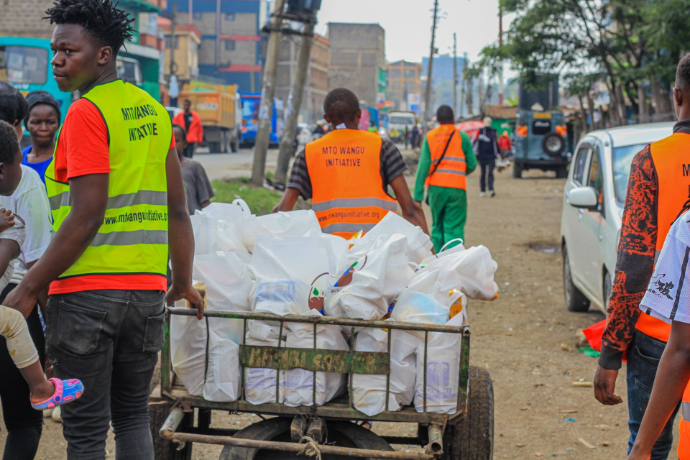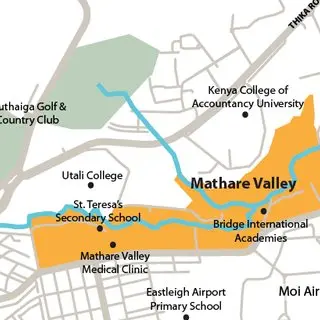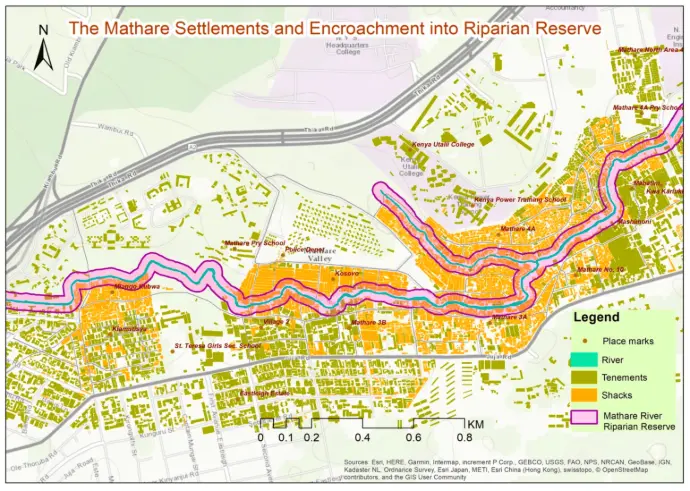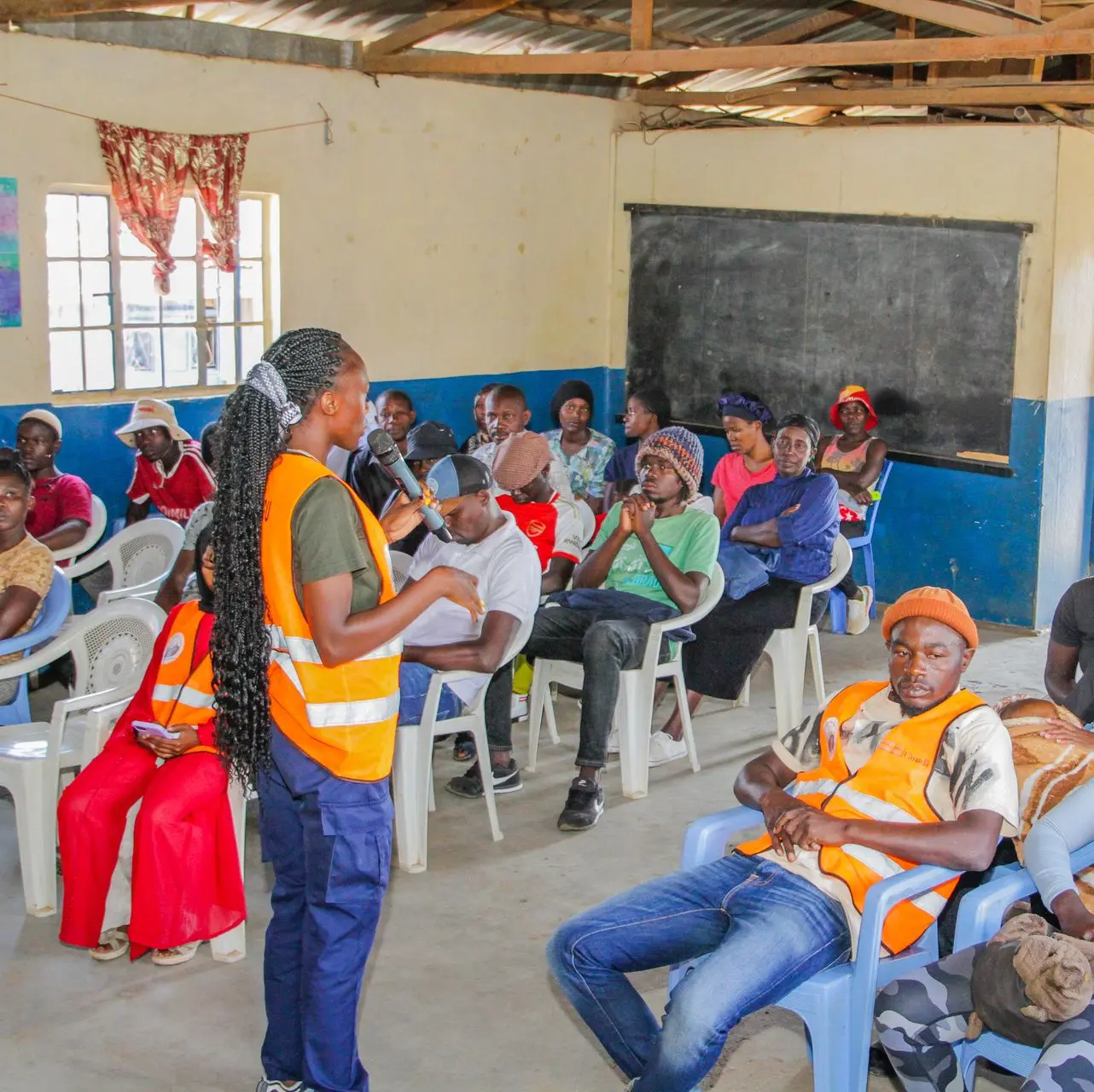Disaster Risk Reduction
At Mto Wangu Initiative, we take a holistic and community-centered approach to disaster response in Mathare. Our work is categorized into four main pillars: Reactive Responses, Early Warning Systems, Vulnerability Assessments, and Dialogues & Public Participation. Each plays a vital role in safeguarding the lives and livelihoods of Mathare’s residents.
Our Actions

Reactive Responses
When disaster strikes, timely and effective action is crucial. Our reactive responses are designed to address immediate needs and minimize harm during and after emergencies.
- Emergency Relief: We provide displaced families with essentials such as temporary shelters, clean drinking water, food supplies, and medical assistance. For example, during the 2024 Mathare floods, In Mathare, bordering Nairobi’s Mathare river, over 4000 households were impacted. People were in dire need of food, hygiene products, mattresses, blankets and school supplies.
- Health and Sanitation: To prevent disease outbreaks, we work to restore damaged sanitation facilities and deploy mobile health clinics to affected areas. We also distribute hygiene kits, including soap, water purification tablets, and mosquito nets.
- Infrastructure Support: Collaborating with local governments and NGOs, we assist in clearing debris, repairing damaged roads, and restoring access to critical community services.
- Trauma Support: Recognizing the mental health toll of disasters, we provide counseling and psychological support, particularly for vulnerable groups like children and mothers.

Early Warning System
Preparation is the first line of defense against disasters. Our early warning systems empower communities to act before a crisis unfolds.
- Community-Based Alert Systems: We train local volunteers to monitor environmental changes, such as rising river levels or unusual weather patterns, and report them through community networks.
- Weather Monitoring and Alerts: Leveraging technology, we disseminate real-time alerts via meetings, social media, and community leaders to warn residents of impending risks like floods or heavy rains.
- Education and Awareness: Our campaigns ensure residents understand the risks and know how to respond. This includes workshops on disaster preparedness and distribution of educational materials tailored to Mathare’s unique challenges.
- Collaboration with Authorities: We work closely with representatives from Kenya Meteorological Department and local government to ensure accurate and timely dissemination of information.

Vulnerability Assessment
Understanding where and how disasters hit the hardest is key to effective intervention. We conduct detailed assessments to identify high-risk zones and prioritize resources.
- Risk Mapping: Using GIS technology and community feedback, we create detailed maps highlighting flood-prone areas, fire risks, and sanitation vulnerabilities.
- Community Surveys: Engaging directly with residents allows us to collect valuable data on their experiences, needs, and priorities during disasters.
- Identifying Vulnerable Groups: Special attention is given to children, the elderly, pregnant women, and people living with disabilities, as they are often disproportionately affected.
- Policy Recommendations: The insights from our assessments are shared with policymakers and stakeholders to guide long-term urban planning and resource allocation.

Dialogues & Public Participation
Sustainable disaster response requires community ownership. We prioritize open dialogue and active participation to ensure solutions are locally driven and inclusive.
- Community Forums: We regularly organize forums where residents can voice their concerns, share experiences, and propose solutions. This participatory approach fosters trust and ensures interventions align with community needs.
- Disaster Preparedness Training: Partnering with schools, women’s groups, and youth organizations, we build local capacity to respond to emergencies. Training covers first aid, evacuation procedures, and basic rescue techniques.
- Partnerships with Local Leaders: We collaborate with community leaders to enhance communication channels and mobilize resources during crises.
- Advocacy and Awareness: Through public campaigns, we promote better environmental practices, such as proper waste disposal, to reduce disaster risks like flooding.
Our Vision for Mathare
Our work aims to build a resilient Mathare where disasters no longer devastate the community. Through swift reactive measures, proactive early warnings, in-depth assessments, and collaborative dialogues, we are creating a safer and more prepared settlement.
By addressing the root causes of vulnerability and empowering the community, we are breaking the cycle of disaster and recovery, one step at a time.
Flood relief and resilience initiative
This report provides an overview of the Mathare Relief Initiative, a program aimed at addressing the immediate needs of families affected by the devastating floods of April 2024, while laying the groundwork for long-term community resilience. Supported by the Canadian government, and other key stakeholders, this initiative embodies the spirit of solidarity and inclusivity.
More DetailsPOLICY BRIEF ON FLOODING IN MATHARE SLUMS, NAIROBI – APRIL 2024
Mathare, one of Nairobi’s oldest informal settlements, is home to over 206,000 residents (Kenya National Bureau of Statistics, 2019). Spanning approximately 3 square kilometers, Mathare is divided into four administrative wards: Mlango Kubwa, Mabatini, Hospital, and Utalii. With a population density exceeding 70,000 individuals per square kilometer, residents face chronic challenges such as inadequate infrastructure, poor drainage, and limited access to basic services.
More Details